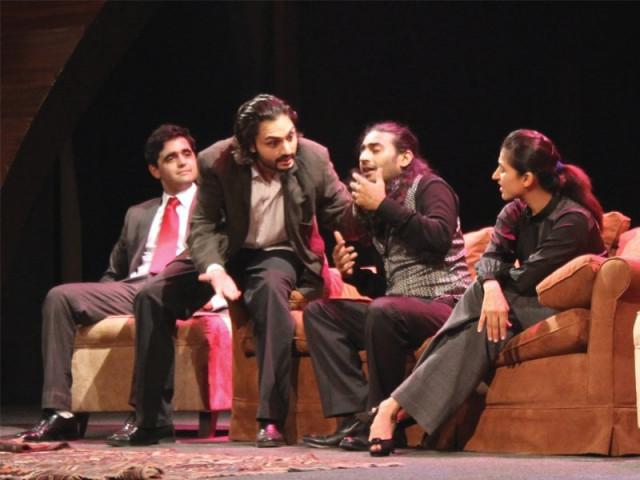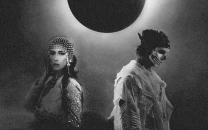The Portrait of Rumi: A domination of Jung over Rumi
The experimental play is a great addition to our country’s theatrical sphere, despite its minor flaws.

The play runs until June 30, from Thursday to Sunday, at 8pm. PHOTO: SANA MASOOD
The problem with merging two of the most influential thinkers of this world is that you can never really do justice to any one of them. Your job becomes even more difficult when those thinkers — Jalaluddin Rumi and Carl Gustav Jung — are from highly diverse school of thoughts. The Portrait of Rumi, a play that kicked off at the National Academy of Performing Arts (Napa) auditorium, essentially suffers from the same problem — extreme hype of great names but a lack of strong ideas, though only slightly. If you are thinking of entering the theatre as a Rumi fan, then you might feel cheated but I reckon you still stick around for a disjunctive narrative combined with an array of absurd ideas.
Written and directed by Ali Junejo and Rouvan Mahmud, The Portrait of Rumi is a collaborative effort of Napa and DadaDali productions that revolves around the life of a painter called Rumi. Rumi (Junejo) is surrounded by his friends who constantly inquire about the reason behind his current state of mind and whether there was a girl to be blamed for. But Rumi is unable to express himself. On realising his inability, his friends start hitting him so that he finally opens up. The rest of the play takes you on a slightly long journey that passes like a stream of river with enough crests and troughs to keep you glued to your seats, until you, along with Rumi, discover what actually happened.

The experimental play is a great addition to our country’s theatrical sphere, despite its minor flaws. PHOTOS: SANA MASOOD
Unfortunately, the only moment when one realises that the play is supposed to be about Rumi is the recurring point when the saying by Rumi, “If we were meant to fly, then what is this cage for?”, is said out loud. The rest of the play is more of an interesting mix of Jung’s ideas and real life characters, who are undergoing neurosis by being unable to “confront their shadows” as Jung would have said. However, what really separated Jung from his mentor Freud, was his search for the unknown or the fulfillment of our deep innate potentials, which he believed, would lead us to a more spiritual journey towards self-discovery. This aspect of Jung, which has lead many thinkers to believe that we live in a world dominated by Jung’s ideas instead of Freud’s, could have easily been used as a bridge between the two but the writers’ attempt didn’t really come through.
Keeping that aside, a psychoanalysis based on Jung’s approach and ideas taken from the works of Rumi stood out independently to serve the bigger purpose of bringing a new avenue in Pakistani theatre. For years, Faiz Ahmed Faiz has been the threshold of Pakistan’s intellectual domain, who more or less became a holy grail that no one looked beyond. However, such plays by ambitious writers like Mahmud and Junejo might help in getting rid of those limitations and exposing the local audience to a more diverse set of ideas.
As far as the set up is concerned, the huge space at Napa is nicely occupied with a two-storey set, but it would have been more interesting if it was utilised properly — maybe a few conversations between characters standing at each level would have helped. A rather surprising element in the play is the focus on a mysterious cage; the sets change and lights are illuminated to assist the stage runners. Whether the cage is purposefully brought in the limelight shall remain a mystery forever.
Acting speaks of commendable talent. Sara Haider as the female patient was immaculate with her small yet sharp appearance, whereas Mahmud (Sal) and Junejo (Rumi) shared great chemistry throughout the play, something that was missing with the rest of the actors. Tara Mahmood added a bit of glitz and glamour with her shiny red top and soulful singing, whereas one was left expecting that the well-known dancer Joshindar Chaggar would move around or dance a little; after all, it was a play based on Rumi.

All in all, it was a good experimental performance that is bound to encourage more youngsters to come out with challenging ideas. Needless to say, we require such plays to bring more diversity in Pakistani theatre. The play runs until June 30, from Thursday to Sunday, at 8pm. Tickets are available at the venue.
VERDICT: In case you are a Rumi fan, you may feel that you were tricked into watching the play but I suggest that you stay till the end to enjoy a show full of absurd yet brain-teasing ideas and a disjunctive narration that will definitely keep you interested for the most part.
Published in The Express Tribune, June 15th, 2013.
Like Life & Style on Facebook, follow @ETLifeandStyle on Twitter for the latest in fashion, gossip and entertainment.



















COMMENTS
Comments are moderated and generally will be posted if they are on-topic and not abusive.
For more information, please see our Comments FAQ